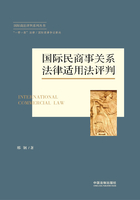
结论
尽管国际私法的发展已经有近八百年的历史,但是,单边主义方法作为法律选择方法最初的形态依旧保持其新的生命力,这绝不能简单认为单边主义是国际私法的“沙文主义”。从上面论述可以得出,单边主义方法在国际私法领域中的延续是地域主权理念的进一步体现,更是法律现实主义的必然选择。在法律选择问题还不能独立于国家而存在,并且这样的选择会涉及国家利益的情况下,单边主义方法的存在就有其合理化的理由。现如今,单边主义方法的回归又一次说明,尽管单边主义方法有其自身的缺陷,但是,当正当和占优势的利益需要保护时,单边主义方法就成了法律选择唯一能求助的路径,现在的问题并不是单边主义方法应不应存在的问题,而是其应该如何以及在多大程度上合理存在。
[1] Morton J.Horwitz,The Transformation of American Law 1870-1960: The Crisis of Legal Orthodoxy,Oxford Vniversity Press,273 n.1 (1992).
[2] 这种攻击在20世纪的第一个十年就开始,See,e.g.,Roscoe Pound,Mechanical Jurisprudence,8 Colum.L.Rev.605 (1908).
[3] Lochner v.New York,198 U.S.45,76 (1905).
[4] 同①注。
[5] Walter W.Cook,Scientific Method of the Law,13 A.B.A.J.303,307 (1927).
[6] E.g.,David F.Cavers,A Critique of the Choice-of-Law Problem,47 Harv.L.Rev.173,173-175 (1933); Walter W.Cook,The Logical and Legal Bases of the Conflict of Laws,33 Yale L.J.457,458-460,464 (1924); Ernest G.Lorenzen,Territoriality,Public Policy and the Conflict of Laws,33 Yale L.J.736,743-746 (1924).
[7] Ernest G.Lorenzen,Territoriality,Public Policy and the Conflict of Laws,33 Yale L.J.736,743-746 (1924).
[8] David F.Cavers,A Critique of the Choice-of-Law Problem,47 Harv.L.Rev.173,173-175 (1933).
[9] 同上注。
[10] 291 F.769 (S.D.N.Y.1923); SeeDavid F.Cavers,The Two “Local Law” Theories,63 HARV.L.REV.822 (1950).
[11] Siegmann v.Meyer,100 F.2d 367 (1938); Scheer v.Rockne Motors Corp.,68 F.2d 942,944 (1934).
[12] SeeWalter Wheeler Cook,The Logical and Legal Bases of the Conflict of Laws,33 YALE L.J.457 (1924).
[13] Gerhard Kegel,“Private International Law: Fundamental Approaches”,in ⅲ international encyclopedia of comparative law 3 (Kurt Lipstein,ed.1986).
[14] Brainerd Currie,selected Essays on the Conflict of Laws 184(1963); Albert a. Ehrenzweig,a Treatise on the Conflict of Laws 326(1962).
[15] Brainerd Currie,Selected Essays on the Conflict of Laws 184(1963).
[16] SeeAlbert A.Ehrenzweig,The Lex Fori-Basic Rule in the Conflict of Laws,58 MICH.L.REV.637 (1960).
[17] Gerhard Kegel,The Crisis of Conflict of Laws,112 RECUEIL DES COURS 89,95 (1964-II).
[18] William S.Dodge,“Extraterritoriality and Conflict of Laws Theory :An Argument for Judicial Unilateralism”,in Harvard International Law Journal Vol.39,1998,pp.107-109.
[19] 陈隆修:《国际私法管辖权评论》,五南图书出版社公司1986年版,第99页。
[20] Larry Kramer,Rethinking Choice of Law,90 Colum.L.Rev.,1990.
[21] Lea Brilmayer,Conflict of Laws:Foundations and Future Directions,Little,Brown and Company,2nd ed.,1995.
[22] 多边主义方法加剧了规范不足的趋向,因为他们把立法管辖权排他地分配给单个国家,而该国立法可能没有法律规定或者没有立法意图去阻止该种损害的发生或者弥补相关的损害。
[23] See Symeon C.Syeonides,Private International Law at the End of 20th Century:Progress or Regress? Kluwer Law International,1998.p.430.
[24] 陈卫佐:《瑞士国际私法法典研究》,法律出版社1998年版。
[25] 2007年6月11日由最高人民法院审判委员会第1429次会议通过的《最高人民法院关于审理涉外民事或商事合同纠纷案件法律适用若干问题的规定》第8条规定:在中华人民共和国领域内履行的下列合同,适用中华人民共和国法律:(一)中外合资经营企业合同;(二)中外合作经营企业合同;(三)中外合作勘探、开发自然资源合同;(四)中外合资经营企业、中外合作经营企业、外商独资企业股份转让合同;(五)外国自然人、法人或者其他组织承包经营在中华人民共和国领域内设立的中外合资经营企业、中外合作经营企业的合同;(六)外国自然人、法人或者其他组织购买中华人民共和国领域内的非外商投资企业股东的股权的合同;(七)外国自然人、法人或者其他组织认购中华人民共和国领域内的非外商投资有限责任公司或者股份有限公司增资的合同;(八)外国自然人、法人或者其他组织购买中华人民共和国领域内的非外商投资企业资产的合同;(九)中华人民共和国法律、行政法规规定应适用中华人民共和国法律的其他合同。尽管该规定已于2013年4月8日被最高人民法院废止,但是,该条款的规定对于解释《合同法》第126条依旧具有现实意义。
[26] See Symeon C.Syeonides,Private International Law at the End of 20th Century:Progress or Regress? Kluwer Law International,1998.p.17.